-
 Bitcoin
Bitcoin $84,566.1805
-0.57% -
 Ethereum
Ethereum $1,592.2699
-0.60% -
 Tether USDt
Tether USDt $0.9999
0.00% -
 XRP
XRP $2.0827
0.05% -
 BNB
BNB $595.0697
0.54% -
 Solana
Solana $133.8668
-0.51% -
 USDC
USDC $0.9999
0.01% -
 Dogecoin
Dogecoin $0.1581
0.11% -
 TRON
TRON $0.2414
-3.25% -
 Cardano
Cardano $0.6267
0.55% -
 UNUS SED LEO
UNUS SED LEO $9.2366
2.17% -
 Chainlink
Chainlink $12.5949
0.15% -
 Avalanche
Avalanche $19.1131
-0.90% -
 Toncoin
Toncoin $3.0082
1.10% -
 Stellar
Stellar $0.2418
0.58% -
 Shiba Inu
Shiba Inu $0.0...01233
3.67% -
 Hedera
Hedera $0.1654
1.00% -
 Sui
Sui $2.1393
-0.24% -
 Bitcoin Cash
Bitcoin Cash $342.0697
2.59% -
 Litecoin
Litecoin $76.9074
1.71% -
 Polkadot
Polkadot $3.6967
1.20% -
 Hyperliquid
Hyperliquid $16.8937
0.83% -
 Dai
Dai $0.9999
-0.03% -
 Bitget Token
Bitget Token $4.3923
0.72% -
 Ethena USDe
Ethena USDe $0.9991
0.00% -
 Pi
Pi $0.6199
0.69% -
 Monero
Monero $217.2905
0.20% -
 Uniswap
Uniswap $5.1988
-0.89% -
 Pepe
Pepe $0.0...07244
-1.72% -
 OKB
OKB $50.5192
-0.32%
What is a ring signature on a blockchain?
Ring signatures enhance privacy on blockchains like Monero by mixing the actual signer's key with decoys, making transactions untraceable.
Apr 12, 2025 at 06:15 am

A ring signature is a type of digital signature that can be used on a blockchain to enhance the privacy and anonymity of transactions. This cryptographic technique allows a group of users to sign a message or transaction in such a way that it is impossible to determine which specific user in the group actually created the signature. Ring signatures are particularly popular in privacy-focused cryptocurrencies like Monero (XMR), where they play a crucial role in obscuring the origin of transactions.
How Ring Signatures Work
Ring signatures work by combining the public keys of multiple participants, including the actual signer and several decoys. The process involves the following key components:
- The actual signer: The user who wants to sign a transaction or message.
- Decoy signers: Other users whose public keys are included in the signature but did not actually sign the transaction.
- Ring: The group of signers, both real and decoy, whose keys are used to create the signature.
When a user wants to sign a transaction, they select a set of public keys from other users on the blockchain. These keys are mixed with the user's own public key to form the ring. The actual signer then uses their private key to create a signature that is valid for the entire ring. This signature can be verified using the public keys of all members of the ring, but it does not reveal which specific key was used to create it.
Benefits of Ring Signatures
Ring signatures offer several significant benefits for blockchain users, particularly in the context of cryptocurrencies:
- Enhanced Privacy: By obscuring the identity of the actual signer, ring signatures make it difficult for outsiders to trace transactions back to their origin. This is particularly valuable for users who wish to maintain their financial privacy.
- Anonymity: The use of decoy signers ensures that the true source of a transaction remains hidden, providing a higher level of anonymity than traditional blockchain transactions.
- Security: Ring signatures are cryptographically secure, making it extremely difficult for malicious actors to forge or tamper with signatures.
Implementation in Monero
Monero is one of the most well-known cryptocurrencies that utilizes ring signatures to enhance user privacy. In Monero, ring signatures are used to mix the sender's input with several other inputs from the blockchain, creating a ring of possible signers. This process is known as "ring confidential transactions" (RingCT), which also hides the amount of the transaction.
To understand how Monero implements ring signatures, consider the following steps:
- Transaction Creation: When a user wants to send Monero, they select a set of inputs from the blockchain, including their own and several decoys.
- Ring Formation: The user's input is combined with the decoy inputs to form a ring.
- Signature Generation: The user signs the transaction using their private key, creating a ring signature that is valid for the entire ring.
- Transaction Verification: The transaction is broadcast to the network, where it can be verified using the public keys of all members of the ring. The verifier can confirm the validity of the signature without knowing which specific key was used to create it.
Challenges and Limitations
While ring signatures offer significant privacy benefits, they also come with certain challenges and limitations:
- Increased Transaction Size: Ring signatures require more data than traditional signatures, which can increase the size of transactions and the overall load on the blockchain.
- Complexity: The cryptographic processes involved in creating and verifying ring signatures are more complex than those used for standard signatures, which can impact the performance of the blockchain.
- Regulatory Concerns: The enhanced privacy provided by ring signatures can make it more difficult for regulators to monitor and track transactions, leading to potential regulatory challenges for cryptocurrencies that use this technology.
Practical Example of Using Ring Signatures
To illustrate how ring signatures work in practice, let's consider a hypothetical scenario where Alice wants to send Monero to Bob while maintaining her privacy:
- Alice's Input: Alice selects her own input, which is the Monero she wants to send to Bob.
- Decoy Inputs: Alice also selects several other inputs from the Monero blockchain, which will serve as decoys.
- Ring Formation: Alice combines her input with the decoy inputs to form a ring.
- Signature Generation: Alice uses her private key to sign the transaction, creating a ring signature that is valid for the entire ring.
- Transaction Broadcast: Alice broadcasts the transaction to the Monero network, where it can be verified using the public keys of all members of the ring.
- Verification: The verifier can confirm the validity of the signature without knowing which specific key was used to create it, ensuring that Alice's transaction remains private.
Frequently Asked Questions
Q: Can ring signatures be used with any cryptocurrency?
A: Ring signatures are most commonly used with privacy-focused cryptocurrencies like Monero. While it is technically possible to implement ring signatures in other cryptocurrencies, it would require significant changes to their underlying protocols and may not be compatible with all blockchain architectures.
Q: How do ring signatures affect the scalability of a blockchain?
A: Ring signatures can increase the size of transactions and the computational load required for verification, which can impact the scalability of a blockchain. However, ongoing research and development in the field of cryptography may lead to more efficient implementations of ring signatures in the future.
Q: Are there any alternatives to ring signatures for enhancing privacy on a blockchain?
A: Yes, there are several other cryptographic techniques that can be used to enhance privacy on a blockchain, including zero-knowledge proofs and confidential transactions. Each of these methods has its own strengths and weaknesses, and the choice of which to use depends on the specific requirements of the cryptocurrency in question.
Q: How do ring signatures protect against double-spending?
A: Ring signatures do not directly protect against double-spending. Instead, they are used to enhance the privacy of transactions. Double-spending protection is typically handled by the consensus mechanism of the blockchain, such as proof-of-work or proof-of-stake, which ensures that transactions are verified and recorded in a way that prevents double-spending.
Disclaimer:info@kdj.com
The information provided is not trading advice. kdj.com does not assume any responsibility for any investments made based on the information provided in this article. Cryptocurrencies are highly volatile and it is highly recommended that you invest with caution after thorough research!
If you believe that the content used on this website infringes your copyright, please contact us immediately (info@kdj.com) and we will delete it promptly.
- Oregon AG Sues Coinbase Over Token Sales
- 2025-04-19 03:20:13
- Bank of America Is Attempting to Monopolize the Stablecoin Market
- 2025-04-19 03:20:13
- Bitcoin (BTC) price could take a hit after US Federal Reserve reports some of the worst manufacturing data in recent history
- 2025-04-19 03:15:13
- ADA Price Prediction: Bold Prediction Lit Up the Cardano Community This Week
- 2025-04-19 03:15:13
- Push For Bitcoin Reserve Gains Momentum In Brazil
- 2025-04-19 03:10:15
- HashKey Capital Launches Asia's First XRP Tracker Fund—with Ripple as an Early Investor.
- 2025-04-19 03:10:15
Related knowledge
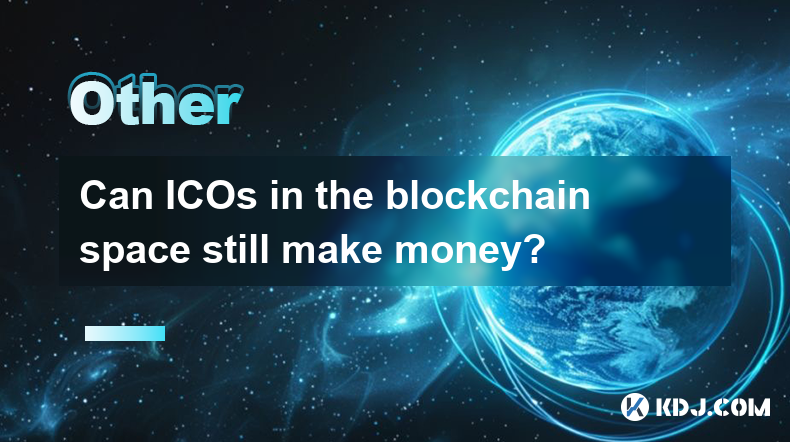
Can ICOs in the blockchain space still make money?
Apr 17,2025 at 08:29pm
The landscape of Initial Coin Offerings (ICOs) in the blockchain space has evolved significantly since their peak in 2017 and 2018. Despite the increased regulatory scrutiny and the rise of alternative fundraising methods like Security Token Offerings (STOs) and Initial Exchange Offerings (IEOs), ICOs can still be a viable way to raise funds and generat...
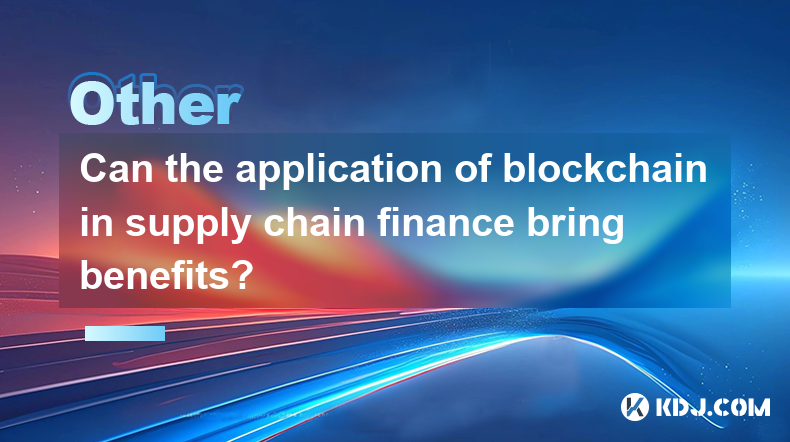
Can the application of blockchain in supply chain finance bring benefits?
Apr 15,2025 at 04:00pm
Can the application of blockchain in supply chain finance bring benefits? The integration of blockchain technology into supply chain finance has garnered significant attention in the cryptocurrency and financial sectors. This article explores how blockchain can potentially revolutionize supply chain finance, detailing its benefits and providing a compre...

Does the ranking of Chinese blockchain apps include cross-chain applications?
Apr 14,2025 at 04:00pm
The ranking of Chinese blockchain apps is a comprehensive evaluation that takes into account various aspects such as user base, transaction volume, and technological innovation. A pertinent question arises regarding whether these rankings include cross-chain applications. Cross-chain applications, which allow different blockchain networks to interact an...
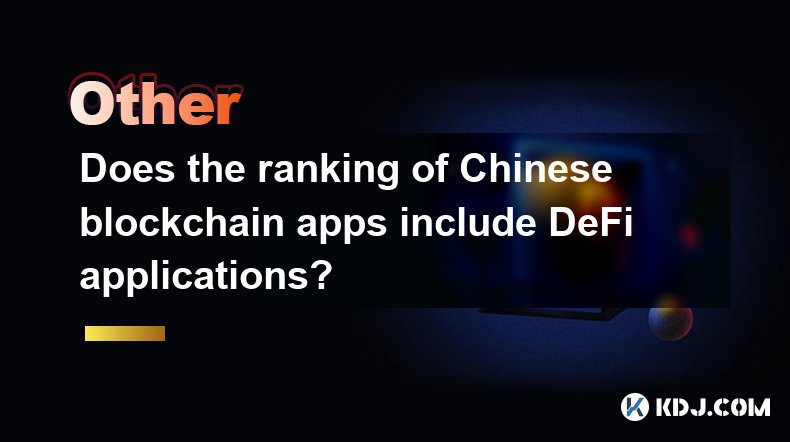
Does the ranking of Chinese blockchain apps include DeFi applications?
Apr 15,2025 at 06:57am
The ranking of Chinese blockchain apps is a comprehensive list that showcases the most popular and influential applications within the cryptocurrency ecosystem. One question that often arises is whether these rankings include DeFi applications. To answer this, we need to delve into the specifics of how these rankings are compiled and what types of appli...
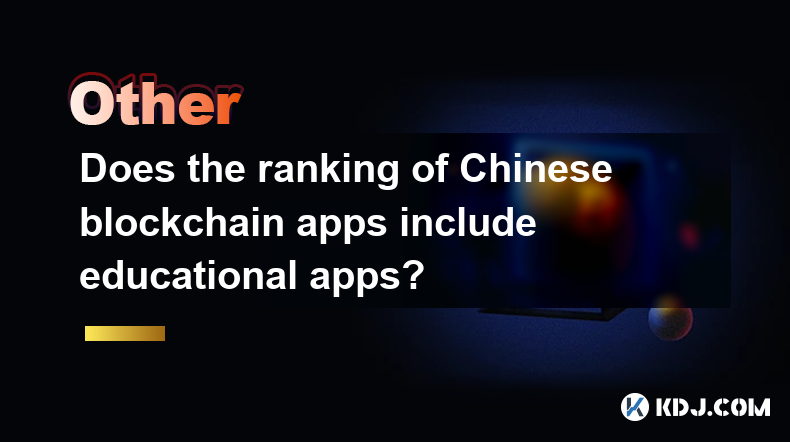
Does the ranking of Chinese blockchain apps include educational apps?
Apr 16,2025 at 03:35am
The ranking of Chinese blockchain apps often includes a variety of categories, from finance and gaming to social networking and beyond. One question that frequently arises is whether these rankings include educational apps. To address this, we need to delve into the specifics of how blockchain apps are categorized and ranked in China, and whether educat...
Does the ranking of Chinese blockchain apps include enterprise-level applications?
Apr 15,2025 at 06:42am
The ranking of Chinese blockchain apps often includes a variety of applications, ranging from consumer-focused to enterprise-level solutions. Understanding the scope and criteria for these rankings is essential to determine if enterprise-level applications are included. This article delves into the specifics of how Chinese blockchain app rankings are co...

Can ICOs in the blockchain space still make money?
Apr 17,2025 at 08:29pm
The landscape of Initial Coin Offerings (ICOs) in the blockchain space has evolved significantly since their peak in 2017 and 2018. Despite the increased regulatory scrutiny and the rise of alternative fundraising methods like Security Token Offerings (STOs) and Initial Exchange Offerings (IEOs), ICOs can still be a viable way to raise funds and generat...

Can the application of blockchain in supply chain finance bring benefits?
Apr 15,2025 at 04:00pm
Can the application of blockchain in supply chain finance bring benefits? The integration of blockchain technology into supply chain finance has garnered significant attention in the cryptocurrency and financial sectors. This article explores how blockchain can potentially revolutionize supply chain finance, detailing its benefits and providing a compre...

Does the ranking of Chinese blockchain apps include cross-chain applications?
Apr 14,2025 at 04:00pm
The ranking of Chinese blockchain apps is a comprehensive evaluation that takes into account various aspects such as user base, transaction volume, and technological innovation. A pertinent question arises regarding whether these rankings include cross-chain applications. Cross-chain applications, which allow different blockchain networks to interact an...

Does the ranking of Chinese blockchain apps include DeFi applications?
Apr 15,2025 at 06:57am
The ranking of Chinese blockchain apps is a comprehensive list that showcases the most popular and influential applications within the cryptocurrency ecosystem. One question that often arises is whether these rankings include DeFi applications. To answer this, we need to delve into the specifics of how these rankings are compiled and what types of appli...

Does the ranking of Chinese blockchain apps include educational apps?
Apr 16,2025 at 03:35am
The ranking of Chinese blockchain apps often includes a variety of categories, from finance and gaming to social networking and beyond. One question that frequently arises is whether these rankings include educational apps. To address this, we need to delve into the specifics of how blockchain apps are categorized and ranked in China, and whether educat...

Does the ranking of Chinese blockchain apps include enterprise-level applications?
Apr 15,2025 at 06:42am
The ranking of Chinese blockchain apps often includes a variety of applications, ranging from consumer-focused to enterprise-level solutions. Understanding the scope and criteria for these rankings is essential to determine if enterprise-level applications are included. This article delves into the specifics of how Chinese blockchain app rankings are co...
See all articles
























































































